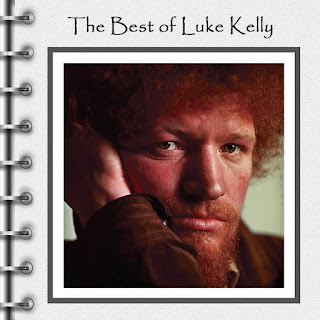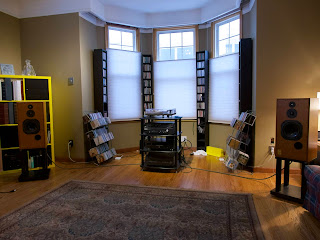Response to Suffering
On my recent trip to Europe I spent the better part of two weeks in Ireland. This trip certainly would not have been complete without listening to some live music and taking some recorded music home was close to absolute.
What is it about the finest folk musicians that they often do not live very long? Luke Kelly was a rather strident one, but his songs nonetheless are certainly part of healing. Like many great folk musicians he died young at 44, in 1984.
 We are living in very "feel good" times. We tend to categorize any negative feeling as at least undesirable or useless or somehow sick even. Certainly dwelling on feelings that are negative can be harmful especially if we don't do something positive about them. Denying them, however, is worse. Maybe this is why we are attracted to euphemisms, terms that soften these things down.
We are living in very "feel good" times. We tend to categorize any negative feeling as at least undesirable or useless or somehow sick even. Certainly dwelling on feelings that are negative can be harmful especially if we don't do something positive about them. Denying them, however, is worse. Maybe this is why we are attracted to euphemisms, terms that soften these things down.
The history of Ireland is very checkered. Like many smaller countries, Ireland has been affected by the politics of other countries. England has been faced internally with issues of unity for centuries with the Welsh and the Scots and as an island country susceptibility to invasion. In turn, the large European powers of France and Spain have been the historical threats and Ireland often seen as a friendly base of operations close to England. The response of the English were different levels of domination and control over the course more than seven centuries. During the Cromwellian period in the middle of 17th century all Catholic monasteries were destroyed in Ireland. At various times, Irish citizens were prevented from holding office in their own country. Catholicism was banned outright for a period. This led to a succession of martyrs. The struggle for Irish autonomy has really been continuous for centuries and it did not arrive without bloodshed. As in other countries problems of land distribution led to abuse of the majority of the population.
It is no mistake in Canada even that many who have been in the forefront of the union movement have come from Ireland. When people have suffered systemic oppression it is only right and just that this be addressed. In these circumstances anger, righteous anger, is part of responding. It cannot be the final word, nor can we hope to build justice by remaining angry, but it literally may be the oomph that gets people to consider what may be positively done about the situation.
The Irish story in part is a story of anger that clearly got out of hand and caused terrible destruction. Anger needs to be transformed. Oddly it can arise out of our care for others. Think of how a parent reacts to a threat to their child. But we have to move quickly to a more balanced stance, realizing that the anger has helped us to identify the wound. Then we need the doctor and the good medicine. Acknowledgement though is needed for successful treatment.
Bards like Luke Kelly bridge some of these things. They are not afraid of the wounds and the upset that sometimes go with it. There is something confessional in all of that. He sings about people who have had to work hard and who have gained little and in some cases suffered direct injustices while trying simply to live.
With the Stormont Agreement substantial peace has come to the Republic of Ireland and to the six northern counties that make up Northern Ireland. You can now cross between the south and north without a passport. You will need to pay for dinner in the north with British pounds and not Euros. The world can be part of the further healing of this island. As the Irish continue to look more outwardly toward the world, they are also encountering more visitors and residents who come from other places. The time to heal has come, but it has come because of the realization of the need to change. Christ went to those in need because of their need. He saw their poverty and suffering and recognized the vessel that was looking to be filled. And He did fill it!
What is it about the finest folk musicians that they often do not live very long? Luke Kelly was a rather strident one, but his songs nonetheless are certainly part of healing. Like many great folk musicians he died young at 44, in 1984.
 We are living in very "feel good" times. We tend to categorize any negative feeling as at least undesirable or useless or somehow sick even. Certainly dwelling on feelings that are negative can be harmful especially if we don't do something positive about them. Denying them, however, is worse. Maybe this is why we are attracted to euphemisms, terms that soften these things down.
We are living in very "feel good" times. We tend to categorize any negative feeling as at least undesirable or useless or somehow sick even. Certainly dwelling on feelings that are negative can be harmful especially if we don't do something positive about them. Denying them, however, is worse. Maybe this is why we are attracted to euphemisms, terms that soften these things down.The history of Ireland is very checkered. Like many smaller countries, Ireland has been affected by the politics of other countries. England has been faced internally with issues of unity for centuries with the Welsh and the Scots and as an island country susceptibility to invasion. In turn, the large European powers of France and Spain have been the historical threats and Ireland often seen as a friendly base of operations close to England. The response of the English were different levels of domination and control over the course more than seven centuries. During the Cromwellian period in the middle of 17th century all Catholic monasteries were destroyed in Ireland. At various times, Irish citizens were prevented from holding office in their own country. Catholicism was banned outright for a period. This led to a succession of martyrs. The struggle for Irish autonomy has really been continuous for centuries and it did not arrive without bloodshed. As in other countries problems of land distribution led to abuse of the majority of the population.
 |
Bernardo O'Higgins: Irish blood went far away to change the world.
|
It is no mistake in Canada even that many who have been in the forefront of the union movement have come from Ireland. When people have suffered systemic oppression it is only right and just that this be addressed. In these circumstances anger, righteous anger, is part of responding. It cannot be the final word, nor can we hope to build justice by remaining angry, but it literally may be the oomph that gets people to consider what may be positively done about the situation.
The Irish story in part is a story of anger that clearly got out of hand and caused terrible destruction. Anger needs to be transformed. Oddly it can arise out of our care for others. Think of how a parent reacts to a threat to their child. But we have to move quickly to a more balanced stance, realizing that the anger has helped us to identify the wound. Then we need the doctor and the good medicine. Acknowledgement though is needed for successful treatment.
Bards like Luke Kelly bridge some of these things. They are not afraid of the wounds and the upset that sometimes go with it. There is something confessional in all of that. He sings about people who have had to work hard and who have gained little and in some cases suffered direct injustices while trying simply to live.
With the Stormont Agreement substantial peace has come to the Republic of Ireland and to the six northern counties that make up Northern Ireland. You can now cross between the south and north without a passport. You will need to pay for dinner in the north with British pounds and not Euros. The world can be part of the further healing of this island. As the Irish continue to look more outwardly toward the world, they are also encountering more visitors and residents who come from other places. The time to heal has come, but it has come because of the realization of the need to change. Christ went to those in need because of their need. He saw their poverty and suffering and recognized the vessel that was looking to be filled. And He did fill it!

